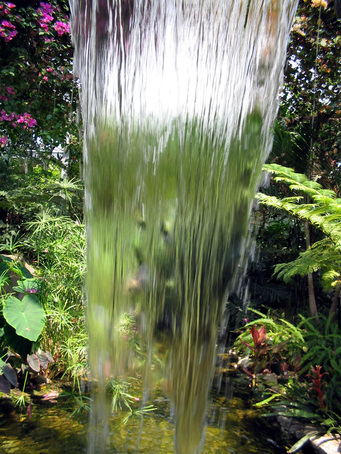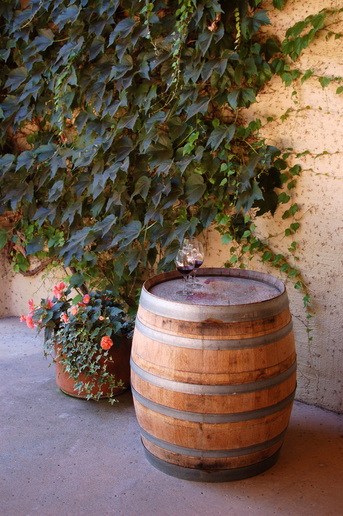|
Metaphors of Health by Ward Fenley Throughout the Bible, virtually every author uses some form of metaphor to describe God, creation, man, events, politics, relationships, good and evil, weakness and strength, sickness and health, and even heaven and hell. Our purpose here is not simply to show the Bible’s use of metaphors for health but to show how certain metaphors of health can apply to our lives in a powerful way. Finding meaning to those metaphors is very important. Equally important is to be careful not to literalize something God intended to be much more meaningful. 
Light
A helpful way to start this brief study of metaphor is with this reference to light from the Gospel of John: John 1:4-5 In him was life; and the life was the light of men. (5) And the light shineth in darkness; and the darkness comprehended it not. John 8:12 Then spake Jesus again unto them, saying, I am the light of the world: he that followeth me shall not walk in darkness, but shall have the light of life. John can properly be identified as the one New Testament writer who uses and explains Biblical metaphors. It is not that he directly defines metaphors. Instead he uses metaphors from the Old Testament in such a way that the reader clearly understands their meaning. John (and the other New Testament writers) makes a very serious assumption: He assumes we are familiar with the Old Testament! How dare he, especially considering the fact that we are far-removed Gentiles living in the 21st century?! How would we know how to interpret light and darkness without a reasonable working knowledge of their use in the Old Testament? One of the most essential pieces of biblical hermeneutics is to understand the audience to whom the author is writing, or equally significant, the audience about whom the author is writing. In the case of John, he, perhaps more than any other author, uses Old Testament metaphors. This is evident in the book of Revelation as well. However many still interpret that book literally. But John never intended these beautiful images to be interpreted literally. He intended them as metaphors to represent God and His people. If John was actually pulling these metaphors from the Old Testament, then we can safely assume that the audience to whom (and about whom) John was writing was Jews who were well acquainted with Old Testament literature. Therefore, if we do not equip ourselves with at least their level of understanding of prophecy and metaphor, we will miss the vast majority of John’s intent. Because the elements of light and darkness as metaphors are used so frequently in Old Testament prophetic passages, one cannot be certain which passage Jesus uses when He declares Himself to be the Light of the world. However, one can safely assume that any passage which speaks prophetically of a time when God (Messiah) would be the Light of His kingdom could be one of many to which Jesus refers. Isaiah is a good place to start. Isaiah frequently refers to the kingdom of Messiah. Specifically, Isaiah uses the metaphor of light at least 29 times. The chapter which uses the word most frequently is chapter 60. Here is each verse which contains the word light: Isaiah 60:1 Arise, shine; for thy light is come, and the glory of the LORD is risen upon thee. Isaiah 60:3 And the Gentiles shall come to thy light, and kings to the brightness of thy rising. Isaiah 60:19-20 The sun shall be no more thy light by day; neither for brightness shall the moon give light unto thee: but the LORD shall be unto thee an everlasting light, and thy God thy glory. (20) Thy sun shall no more go down; neither shall thy moon withdraw itself: for the LORD shall be thine everlasting light, and the days of thy mourning shall be ended. The context of this entire chapter shows God to be the One who fulfills this position of the everlasting Light of the Messianic kingdom. In verse 1, Israel’s light (God) is the glory of the Lord. Gentiles would come to that light. Paul and Barnabas are said to be representatives of that light and even that light itself: Acts 13:47 For so hath the Lord commanded us, saying, I have set thee to be a light of the Gentiles, that thou shouldest be for salvation unto the ends of the earth. In verses 19 and 20 of Isaiah 60, God is the everlasting light of Israel and the Gentiles. This light is obviously in contrast to the darkness which previously covered the people under the Old Covenant: Isaiah 60:2 For, behold, the darkness shall cover the earth, and gross darkness the people: but the LORD shall arise upon thee, and his glory shall be seen upon thee. This prophecy is very similar to an earlier chapter: Isaiah 9:2 The people that walked in darkness have seen a great light: they that dwell in the land of the shadow of death, upon them hath the light shined. This is said to be fulfilled through the advent of Christ: Matthew 4:13-16 And leaving Nazareth, he came and dwelt in Capernaum, which is upon the sea coast, in the borders of Zabulon and Nephthalim: (14) That it might be fulfilled which was spoken by Esaias the prophet, saying, (15) The land of Zabulon, and the land of Nephthalim, by the way of the sea, beyond Jordan, Galilee of the Gentiles; (16) The people which sat in darkness saw great light; and to them which sat in the region and shadow of death light is sprung up. The shadow of death is none other than that which plagued king David as well as the rest of the believers under the curse of the Old Covenant: Psalm 23:4 Yea, though I walk through the valley of the shadow of death, I will fear no evil: for thou art with me; thy rod and thy staff they comfort me. David was simply saying that even though he knew he was walking in the valley of the shadow of death and not in the light of Christ, he had the promises of God’s word to remind him that one day he would awake to the light and righteousness of Christ: Psalm 16:11 Thou wilt shew me the path of life: in thy presence is fulness of joy; at thy right hand there are pleasures for evermore. Psalm 17:15 As for me, I will behold thy face in righteousness: I shall be satisfied, when I awake, with thy likeness. Here are a few more examples of light used as a metaphor of health representing God and the glory of the kingdom: Isaiah 49:6 yea, he saith, It is too light a thing that thou shouldest be my servant to raise up the tribes of Jacob, and to restore the preserved of Israel: I will also give thee for a light to the Gentiles, that thou mayest be my salvation unto the end of the earth. Psalm 112:4 Unto the upright there ariseth light in the darkness: He is gracious, and merciful, and righteous. Micah 7:9 I will bear the indignation of Jehovah, because I have sinned against him, until he plead my cause, and execute judgment for me: he will bring me forth to the light, and I shall behold his righteousness. Once we are able to understand how light is used in the Old Testament to refer to God and His kingdom, we can also appreciate its contrast with darkness as well as the literal light of the sun. Metaphors in Scripture are most importantly used to refer to God and His kingdom. But they also show us how to view the actual physical object. It is no secret that the sun offers tremendous health benefits such as helping prevent many forms of cancer as well as preventing depression, and plays the vital part in the process of photosynthesis. As we weigh the significance of the sun in prophetic passages, we should strive to remind ourselves of the kingdom as we ponder the value of the physical sun. The benefits of the sun are not there by chance. They are there primarily for the purpose of helping God’s people remember who He is to them and what He has done (and is doing) for them. Sun has lightened the darkness of self-righteousness. Through the Sun (Psalm 19; Malachi 4), healing is brought to the people of God and God has lightened their way to be able to see that their own works and deeds cannot possibly deliver them from death and separation from God. The light of the Gospel shows the beauty of forgiveness of sins solely through the shed blood of Christ. 
Water
Another important metaphor is water. Water is also used in the book of John to speak of life through Christ: John 4:10 Jesus answered and said unto unto her, If thou knewest the gift of God, and who it is that saith to thee, Give me to drink; thou wouldest have asked of him, and he would have given thee living water. John 4:13-14 Jesus answered and said unto her, Every one that drinketh of this water shall thirst again: (14) but whosoever drinketh of the water that I shall give him shall never thirst; but the water that I shall give him shall become in him a well of water springing up unto eternal life. John 7:37-38 Now on the last day, the great day of the feast, Jesus stood and cried, saying, If any man thirst, let him come unto me and drink. (38) He that believeth on me, as the scripture hath said, from within him shall flow rivers of living water. Waters, too, were predicted to be a fundamental aspect of the kingdom of God and in fact refer to God Himself: Isaiah 33:21 But there Jehovah will be with us in majesty, a place of broad rivers and streams, wherein shall go no galley with oars, neither shall gallant ship pass thereby. Isaiah 35:6 Then shall the lame man leap as a hart, and the tongue of the dumb shall sing; for in the wilderness shall waters break out, and streams in the desert. Isaiah 55:1 Ho, every one that thirsteth, come ye to the waters, and he that hath no money; come ye, buy, and eat; yea, come, buy wine and milk without money and without price. Ezekiel 36:25 And I will sprinkle clean water upon you, and ye shall be clean: from all your filthiness, and from all your idols, will I cleanse you. Water from a prophetic standpoint would cleanse, quench thirst, and help bring forth fruit. God says He would be those broad rivers or living waters. Christ proclaims Himself to be the fulfillment of that. In the physical world, hardly anything can match the importance of water. Water replenishes, purifies, washes, feeds, causes gardens to grow, and life to continue. The picture Christ gives to the woman at the well is vital to our understanding. There was the well of Jacob, which represented the temporal earthly satisfaction of self-righteousness, yet found its limits within the sinful nature of man. However, Christ contrasted His living water springing up into everlasting life. Christ said of Jacob’s well, “Whoever drinks of this water shall thirst again.” (vs. 13) It represented a temporal righteousness, just as the well was only so deep and so full; whereas the water of Christ is eternal. Just as the well which was physically seen would also physically be emptied, so also the works of self-righteousness are empty and shown wanting. But Paul exclaims, “We look not on the things which are seen but upon the things which are unseen. For the things which are seen are temporal, but the things which are unseen are eternal.” (2 Corinthians 4:18) 
Trees
Trees are a beautiful metaphor used to show health and growth and security in the kingdom of God. Jesus uses this example to magnify this metaphor: Matthew 13:31-32 Another parable set he before them, saying, The kingdom of heaven is like unto a grain of mustard seed, which a man took, and sowed in his field: (32) which indeed is less than all seeds; but when it is grown, it is greater than the herbs, and becometh a tree, so that the birds of the heaven come and lodge in the branches thereof. Revelation 2:7 He that hath an ear, let him hear what the Spirit saith to the churches. To him that overcometh, to him will I give to eat of the tree of life, which is in the Paradise of God. Revelation 22:2 in the midst of the street thereof. And on this side of the river and on that was the tree of life, bearing twelve manner of fruits, yielding its fruit every month: and the leaves of the tree were for the healing of the nations. Again, these metaphors are drawn from similar Old Testament prophetic passages, not the least of which is the most well-known: Psalm 1:3 And he shall be like a tree planted by the streams of water, That bringeth forth its fruit in its season, Whose leaf also doth not wither; And whatsoever he doeth shall prosper. Also, however, are sufficient and lucid examples from Isaiah: Isaiah 55:12 For ye shall go out with joy, and be led forth with peace: the mountains and the hills shall break forth before you into singing; and all the trees of the fields shall clap their hands. Isaiah 60:13 The glory of Lebanon shall come unto thee, the fir-tree, the pine, and the box-tree together, to beautify the place of my sanctuary; and I will make the place of my feet glorious. Isaiah 61:3 to appoint unto them that mourn in Zion, to give unto them a garland for ashes, the oil of joy for mourning, the garment of praise for the spirit of heaviness; that they may be called trees of righteousness, the planting of Jehovah, that he may be glorified. This next passage conjoins water with trees: Isaiah 41:18-19 I will open rivers on the bare heights, and fountains in the midst of the valleys; I will make the wilderness a pool of water, and the dry land springs of water. (19) I will put in the wilderness the cedar, the acacia, and the myrtle, and the oil-tree; I will set in the desert the fir-tree, the pine, and the box-tree together: In all of the above passages trees represent the people of God. They are firmly planted, diverse, and beautiful; plus they represent the sanctuary of God and even God’s righteous planting for His glorification. Physical trees produce fruit, oxygen, beauty, forests, provide wood for buildings, paper, sap, and provide a multitude of other uses, for which we may praise and thank God. But ultimately their primary purpose is to reveal to us our strength, beauty, diversity, community, and productivity in God’s kingdom. 
Wine
For our last example we find the metaphor of wine used in John: Luke 5:37-39 And no man putteth new wine into old wine-skins; else the new wine will burst the skins, and itself will be spilled, and the skins will perish. (38) But new wine must be put into fresh wine-skins. (39) And no man having drunk old wine desireth new; for he saith, The old is good. This new wine represents the New Covenant in Christ’s blood, not to be mixed with the old (“If you are circumcised, Christ shall profit you nothing.” (Galatians 5:2) This new wine was foretold: Isaiah 62:8 Jehovah hath sworn by his right hand, and by the arm of his strength, Surely I will no more give thy grain to be food for thine enemies; and foreigners shall not drink thy new wine, for which thou hast labored: Isaiah also spoke of a different type of laboring for wine: Isaiah 55:1-2 Ho, every one that thirsteth, come ye to the waters, and he that hath no money; come ye, buy, and eat; yea, come, buy wine and milk without money and without price. (2) Wherefore do ye spend money for that which is not bread? and your labor for that which satisfieth not? hearken diligently unto me, and eat ye that which is good, and let your soul delight itself in fatness. The labor would be faith in Jesus Christ. “Buy wine and milk without money and without price.” This concept is foreign to the natural man. We are used to earning our milk and our wine. But here God tells us to get it without money and without price. That is, this wine and milk would be gotten, “ ‘not by might, not by power, but by My Spirit,’ says the Lord.” (Zechariah 4:6) Or as Christ preaches: John 6:63 It is the spirit that giveth life; the flesh profiteth nothing: the words that I have spoken unto you are spirit, are are life. The kingdom of God is righteousness, joy, and peace in the Holy Spirit. Joy and gladness are a crucial part of our existence in the kingdom of God. This comes from the new wine of Christ. It is fascinating that the Old Testament tells us that wine gladdens heart of man because God has given it to do so: Psalm 104:10-15 He sendeth forth springs into the valleys; They run among the mountains; (11) They give drink to every beast of the field; The wild asses quench their thirst. (12) By them the birds of the heavens have their habitation; They sing among the branches. (13) He watereth the mountains from his chambers: The earth is filled with the fruit of thy works. (14) He causeth the grass to grow for the cattle, And herb for the service of man; That he may bring forth food out of the earth, (15) And wine that maketh glad the heart of man, And oil to make his face to shine, And bread that strengtheneth man's heart. It is interesting that many well-meaning Christians demonize wine. But would they demonize the sun? Would they demonize water? Would they demonize trees, or milk, or honey, or the stars? If not, why demonize the glorious creation of wine to speak of many things, not the least of which are the blood of Christ, joy, gladness, and the New Covenant? This is precisely why Paul said: 1 Corinthians 10:29-31 …conscience, I say, not thine own, but the other's; for why is my liberty judged by another conscience? (30) If I partake with thankfulness, why am I evil spoken of for that for which I give thanks? (31) Whether therefore ye eat, or drink, or whatsoever ye do, do all to the glory of God. We may exult in the sun, gaze upon the trees, drink water, sip wine, all to the glory of God, for all these things (and innumerable others) represent God and His kingdom. 1 Corinthians 2:9-10 but as it is written, Things which eye saw not, and ear heard not, And which entered not into the heart of man, Whatsoever things God prepared for them that love him. (10) But unto us God revealed them through the Spirit: for the Spirit searcheth all things, yea, the deep things of God. Sadly, many believe that we are still waiting for these things God prepared. But Paul says they have been revealed to us by the Spirit. These Old Testament metaphors of spiritual health and life are meant to show us who Christ is and what Christ has done for us. Understanding these metaphors plays a critical part in our understanding what it means to be in the kingdom of God. It is not enough to simply read our New Testaments. The New Testament is the revealing of the Old Testament prophecies of Jesus Christ. It is impossible to understand one without the other. And it is certainly impossible to understand the mysteries of the kingdom of heaven without understanding how God spoke to His people of old. May He give all of us eyes to see and ears to hear, and may He cause to enter into our hearts those things which He has revealed to them that love Him. Printable PDF file of this article:
|
Ward Fenley 
Ward Fenley resides in Westcliffe, Colorado with his two boys, Austin and Trumann. He teaches for an online virtual academy and also teaches private music lessons. Ward enjoys hiking, composing, and of course, writing about and discussing theology. He has written two books and many articles dealing with the kingdom and grace of God. Ward's current focus is on the subjects of the conscience and mercy in Scripture and how those elements relate to our everyday lives and those around us. He believes that love shown through mercy is the captivating element which not only proves the existence of the kingdom of God, but is also that which draws unbelievers to inquire into our faith in Jesus Christ.
| ||||||